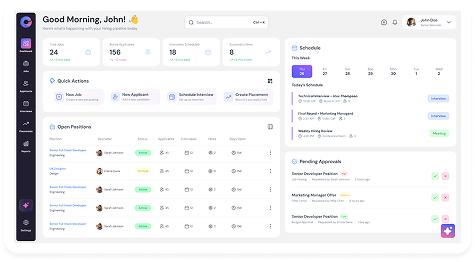Human Resource Management (HRM) is the strategic approach to managing an organization’s workforce. It encompasses all aspects of the employee lifecycle, from attracting and recruiting talent to developing, rewarding, and retaining them. An effective HRM strategy aligns with the organization’s overall goals and ensures it has the right people in the right roles at the right time.
Core Functions of HRM:
- Talent Acquisition: This involves attracting, recruiting, screening, and selecting qualified candidates to fill open positions.
- Onboarding: The process of integrating new hires into the organization and helping them become productive members of the team.
- Learning and Development: Providing training and development opportunities to help employees grow their skills and knowledge.
- Performance Management: Setting goals, providing feedback, and evaluating employee performance.
- Compensation and Benefits: Administering salaries, wages, bonuses, and other forms of employee compensation, as well as managing employee benefits programs.
- Employee Relations: Maintaining positive relationships with employees, addressing their concerns, and fostering a healthy work environment.
- Workforce Planning: Forecasting future talent needs based on business goals and organizational strategies.
- HR Compliance: Ensuring the organization adheres to all relevant labor laws and regulations.
Benefits of Effective HRM:
- Improved Employee Engagement: A strong HRM strategy can help create a work environment where employees feel valued, motivated, and productive.
- Reduced Turnover: By investing in employee development and creating a positive work environment, organizations can reduce turnover and its associated costs.
- Enhanced Employer Brand: Effective HRM practices can help attract and retain top talent, leading to a stronger employer brand.
- Increased Productivity: Well-trained and engaged employees are more likely to be productive and contribute to the organization’s success.
- Improved Compliance: A strong understanding of HR regulations can help organizations avoid costly legal issues.
Modern Trends in HRM:
- The Rise of HR Technology: HR technology solutions are streamlining processes, automating tasks, and providing valuable data insights.
- Focus on Employee Experience: Organizations are increasingly focused on creating a positive employee experience throughout the entire employment lifecycle.
- The Evolving Workplace: The rise of remote work, the gig economy, and artificial intelligence (AI) are all impacting HRM practices.
- Importance of Data-Driven Decisions: HR professionals are leveraging data analytics to make more informed decisions about talent management.
- Focus on Diversity, Equity, and Inclusion (DE&I): Creating a diverse and inclusive workplace is becoming a top priority for many organizations.
In Conclusion:
HRM plays a critical role in the success of any organization. By implementing effective HRM strategies, organizations can attract, retain, and develop a high-performing workforce that contributes to achieving their business goals.

